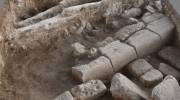The proposed educational directive reportedly includes anti-Semitism and anti-Israel bias, with little, if any, Jewish input into what will be taught to public school students.
By Jackson Richman, JNS
More than a dozen California school boards have adopted resolutions in support of the state’s proposed ethnic-studies model curriculum, despite the fact that it came under fire for containing anti-Semitic and anti-Israel content and does not address issues of anti-Semitism or include Jewish Americans.
“Over the past few months … individuals, who call themselves ‘Save CA Ethnic Studies,’ have attempted to take advantage of state and local education officials’ focus on addressing the COVID-19 crisis to get school boards throughout the state to rubber-stamp, with little or no discussion, a resolution that ‘affirms support of the California Ethnic Studies Model Draft … ,’ ” read a letter written by some 88 state and national organizations to the California Department of Education (CDE).
The groups also accused the Save CA Ethnic Studies campaign of deceiving local officials.
“School board members asked to vote on the resolution are not shown the original draft curriculum, and [are] not informed about the enormous outpouring of criticism it engendered or that a CDE process is well underway for the curriculum’s redesign,” said the letter.
As such, local school officials believe that they are voting to support a 2016 California law to establish ethnic-studies curriculum, known as AB-2016.
School board members are “led to believe that in voting for the resolution they are showing support for AB-2016 and affirming the importance of ethnic studies classes in general, rather than endorsing the highly controversial draft curriculum that was condemned by dozens of state leaders and tens of thousands of Californians,” stated the letter.
The proposed curriculum section on “Arab American Studies Course Outline” contains a number of passages concerning the Israeli-Palestinian conflict, such as “Direct Action Front for Palestine and Black Lives Matter,” “Call to Boycott, Divest and Sanction Israel” and “Comparative Border Studies: Palestine and Mexico.” It also includes studying national figures such as Rep. Ilhan Omar (D-Minn.), Rep. Rashida Tlaib (D-Mich.), the late Columbia University professor Edward Said, Women’s March leader Linda Sarsour, the late radio personality Casey Kasem, actress Alia Shawkat and the late White House correspondent Helen Thomas—all of whom are associated with anti-Semitic and anti-Israel rhetoric, and in the case of the congresswomen, a push to enact legislation punishing Israel.
Outrage from Lawmakers and the Jewish Community
Last year, following outrage by California lawmakers, Jewish and pro-Israel groups, and the Jewish and non-Jewish community at large for such bias and omissions, the California Board of Education announced that it would substantially revise its current draft ethnic-studies curriculum, noting that it did “not yet fully align with the statutory requirements” and the state’s guidelines.
In August 2019, the California State Board of Education stated that “the current draft model curriculum falls short and needs to be substantially redesigned. Following the Instructional Quality Commission’s review and response to all public comments, a new draft will be developed for State Board of Education review and potential approval. The Board will ultimately adopt an ethnic studies model curriculum that aligns [with] California’s values.”
The State Superintendent of Public Instruction Tony Thurmond agreed, calling for “greater balance to this entire curriculum,” including in how it handles Jewish Americans, anti-Semitism and Israel.
In January, California’s Department of Education announced that it will recommend that the Ethnic Studies Model Curriculum (ESMC) focus on four “foundational” groups: African-Americans, Asian-Americans, Chicano/Latinos and Native Americans. That move was criticized for its narrow focus on “people of color” while ignoring several other significant ethnic or religious groups in the state, such as the Jewish, Greek and Armenian communities.
Despite the ongoing debate over the ethnic-studies curriculum, at least 13 school boards in the state have recently passed resolutions affirming their support for the ethnic-studies model curriculum draft: Hayward (April 22), Castro Valley (April 23), Albany (April 28), San Francisco (April 28), West Contra Costa (May 6), Alhambra (May 19), Oakland (May 27), South San Francisco (May 28), Jefferson Union (June 2), Jefferson Elementary (June 17), San Mateo Foster City (June 18), El Monte Union (June 24) and Santa Rosa City Schools (July 8).
“Save CA Ethnic Studies’ misleading campaign to get district school-board members throughout California to adopt disingenuous resolutions in support of the original draft is a clear attempt to circumvent the state’s official plan for revisions of the model curriculum,” said Tammi Rossman-Benjamin, director of the AMCHA Initiative, which initiated the letter to the California Department of Education.
‘Unclear What We Are Supporting’
For example, the Oakland Unified School Board passed a resolution with four votes in favor, two against and one abstention, stating that it supports “the California Ethnic Studies Model Curriculum Draft as written,” including content about Pacific Islanders, Arab Americans, Central Americans, and West Asian Americans and to keep “its framing and language of the discipline, with additional scaffolding as necessary to be inclusive and supportive of multiple users.”
During its May 27, 2020 school-board meeting, Oakland Unified School Board president Jody London raised questions over the ethnic-studies curriculum that they were considering. She said in theory, she supported having an ethnic-studies model curriculum and passing a resolution setting forth the values the Oakland School Board would like to see in the state’s model curriculum, instead of one that interferes with the state’s process, according to meeting notes. This “resolution doesn’t allow [revisions]” and is “unclear about what is it we are supporting,” London told the board.
Similarly, questions were also raised after Albany Unified School Board voted to support the ethnic-studies curriculum.
On April 28, the Albany Unified School Board unanimously passed a resolution that “affirms support for the current California Assembly Bill 2016 Ethnic Studies Model Curriculum draft” and for the curriculum to “keep the disciplinary language, framing, guiding values, principles and outcomes of the field of Ethnic Studies.”
After that meeting, it got some public pushback, and on June 9 the board discussed whether to revisit that vote.
Among the public input the Albany Board received was a statement from the presidents of the California Latino School Boards Association. Asian Pacific Islander School Board Members Association and the Association of Black School Educators supporting the model curriculum with “additional integration of Jewish Americans and other ethnic groups, as well as a definition of anti-Semitism … as long as they do not decenter communities of color in any way from the curriculum.”
The Anti-Defamation League’s Central Pacific Region, writing in favor of the Albany Board revisiting this resolution, stated that its resolution “is not about supporting Ethnic Studies but instead endorses the polarizing and offensive political views. The California Department of Education (CDE) already rejected the ESMC for its failure to meet the goals of the authorizing statute AB-2016. The CDE is making substantive revisions to be made public in August 2020. The Resolution before you is misleading and contravenes the legal process.”
The Albany Unified resolution was not revisited for another vote.
Curriculum ‘Should Be Free from Politics’
As local school boards debate the issues regarding the ethnic-studies curriculum, a bill in the California Assembly is being pushed forward that would require ethnic studies as part of graduation requirement, known as AB-331.
AB-331 is a bill that, if passed, would require ethnic studies as a California high school graduation requirement, starting with the 2024–25 school year, “based on” the ethnic studies model curriculum developed by the state.
It was introduced in the Spring of 2019 by Assembly Member Jose Medina, a Democrat who chairs the Assembly Higher Education Committee and is a member of the California Legislative Jewish Caucus.
Medina suspended his bill after the summer 2019 ethnic-studies draft curriculum controversy, he said because “it is more important to me that we get it right than we do it quickly…My goal as a teacher was to leave students who could think for themselves.”
He also said, “I did not feel comfortable having the senate vote on a curriculum that is not finished.”
He added, “The curriculum would be stronger if it were more comprehensive of additional groups’ experiences.”
In a seeming reversal, Medina is now pushing forward with the bill ahead of the Aug. 31 deadline for bills introduced during the legislative session to pass, before the ethnic studies model curriculum is finalized.
“#AB331 is moving through the legislative process, but we still need your help to make #EthnicStudiesforALL! Keep up the momentum to get AB 331 out of the Senate Appropriations Committee at the end of July. Our history should not be optional,” tweeted Medina on June 26.
AB-331 is scheduled to be heard by the California Senate Appropriations Committee on July 31. If it passes there, it will be voted on by the California Senate and Assembly ahead of the August deadline. If that passes, it will go to Democratic Gov. Gavin Newsom for signature or veto before the model curriculum is approved by the state.
A Medina spokesperson told JNS that the assembly member “has been working with the Jewish community and different Jewish groups.”
Jewish and pro-Israel groups have called for Jews to be represented in the ethnic-studies curriculum.
The AMCHA Initiative is “incredibly concerned about this deceitful maneuver by those who helped write the deeply flawed and widely condemned initial draft curriculum,” Rossman-Benjamin told JNS.
“Regarding AB-331, at a time when our country is in deep distress in so many ways and we’re so divided and so polarized, it is critical that the curriculum put forth by the state aims to unite people and will help create a more positive, healthier climate in California’s school,” said Rossman-Benjamin. “That was the problem with the initial draft curriculum; it wasn’t meant to educate students but to promote a political agenda, a radical one at that.”
Therefore, continued Rossman-Benjamin, “I think it’s important that we know that the curriculum which will form the basis for what is taught in California high schools and mandated by AB-331 will be free of politics. Curriculums should educate, not indoctrinate students into the particular political ideology of its drafters.”
Sarah Levin, executive director of JIMENA: Jews Indigenous to the Middle East and North Africa, told JNS that her organization “looks forward to our schools and students receiving the highest quality, most rigorous ethnic-studies curriculum, which is surely not the earlier draft curriculum that omitted the voices of diverse Middle Eastern Diasporic communities that live in California.”
She continued, “We are proud to work together with a broad coalition of minority voices from inside and outside the Jewish community, including Coptic-Christians, Assyrian-Christians and Iranians of different faiths, to support the creation of an Ethnic Studies Curriculum that is accurate, balanced and reflects Middle Eastern student demographics in California.”

HELP ISRAELIS BATTLE CORONA!
Donate to the Corona Emergency Relief Fund. Coronavirus has taken a huge toll on the people of Israel. The poor, elderly and ill are most vulnerable.
Israeli soldiers, security officers and medical care providers operate under great danger and risk to life.
Over 1 million Israelis are out of work. Many cannot make ends meet. We provide financial aid, food, medical supplies and more. Funds are distributed where needed most. The time to act is now!
United with Israel extends a special note of appreciation to the Genesis Prize for their generous support.
Do You Love Israel? Make a Donation - Show Your Support!
Donate to vital charities that help protect Israeli citizens and inspire millions around the world to support Israel too!
Now more than ever, Israel needs your help to fight and win the war -- including on the battlefield of public opinion.
Antisemitism, anti-Israel bias and boycotts are out of control. Israel's enemies are inciting terror and violence against innocent Israelis and Jews around the world. Help us fight back!























